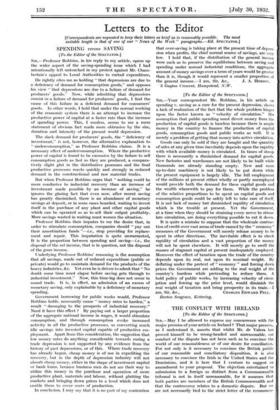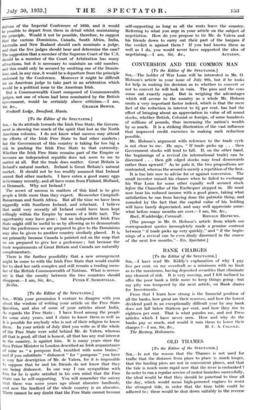THE CONFLICT WITH IRELAND [To the Editor of the SPECTATOR.]
SIR,—May I be allowed to express my concurrence with the major premise of your article on Ireland? That major premise, as I understand it, asserts that whilst Mr. de Valera has proved himself to be wrong-headed and unreasonable, our conduct of the dispute has not been such as to convince the world of our reasonableness or of our desire for conciliation. For not only is it necessary to convince the British public of our reasonable and conciliatory disposition, it is also necessary to convince the Irish in the United States and the Dominions, and it is here that I venture to suggest an amendment to your proposal. The objection entertained to submission to a foreign as distinct from a Commonwealth tribunal is not in itself unreasonable, for it assumes that both parties are members of the British Commonwealth and that the controversy relates to a domestic dispute. But we are not necessarily tied to the strict letter of the recommen-
dations of the Imperial Conference of 1930, and it would be possible to depart from them in detail whilst maintaining the principle. Would it not be possible, therefore, to suggest that the various Dominions, Canada, South Africa, India, Australia and New Zealand should each nominate a judge, and that the five judges should hear and determine the case? The suggestion that a member of the Supreme Court of the U.S. should be a member of the Court of Arbitration has many attractions, but it is necessary to maintain an odd number, and this could only be secured by omitting one of the Domin- ions, and, in any case, it would be a departure from the principle endorsed by the Conference. Moreover it might be difficult for an American judge to take part in an arbitration which would be a political issue to the American Irish.
But a Commonwealth Court composed of- Commonwealth judges, not one of whom had been nominated by the British Government, would be certainly above criticism.—I am,
Sir, &c., GRAHAM BOWER.
Studwell Lodge, Droxford, Hants.































 Previous page
Previous page